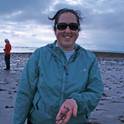
Contribution to Book
Building Capacity for Meaningful Watershed Educational Experiences
Exemplary Practices in Marine Science Education
(2018)
Abstract
As a signatory of the Chesapeake 2000 Agreement, the Commonwealth of Virginia, USA, pledged to help provide a meaningful, watershed-focused outdoor experience (MWEE) for every student prior to their graduation from high school . While the benefits of such hands-on , inquiry-based field experiences are well-documented, effective programs are not always easy for classroom teachers to implement. Common obstacles include lack of funding, transportation issues, and teacher confidence. Starting in 2010, the Chesapeake Bay National Estuarine Research Reserve (CBNERR) and the Virginia Institute of Marine Science’s Marine Advisory Program (VIMS MAP) partnered to provide professional development workshops with the goal of increasing educators’ knowledge of local flora and fauna, wetland ecology , scientific instruments, and field safety measures. Drawing from program experiences and a needs assessment of area teachers , this chapter illustrates challenges that educators face in conducting MWEEs and presents a tested approach for building capacity in watershed programming. The chapter concludes with recommendations for systemic approaches to MWEE training that has emerged from CBNERR and VIMS MAP initiatives.
Disciplines
Publication Date
June, 2018
Editor
Géraldine Fauville, Diana L. Payne, Meghan E. Marrero, Annika Lantz-Andersson, Fiona Crouch
Publisher
Springer
DOI
https://doi.org/10.1007/978-3-319-90778-9_18
Citation Information
Sarah McGuire Nuss, Kristen Sharpe, Carol Hopper Brill and et al.. "Building Capacity for Meaningful Watershed Educational Experiences" Exemplary Practices in Marine Science Education (2018) p. 323 - 340 Available at: http://works.bepress.com/sarah-nuss/14/
